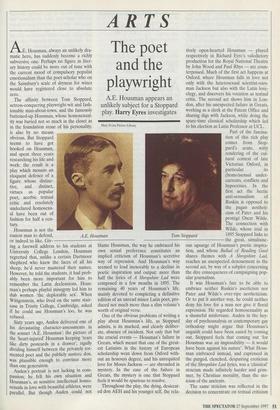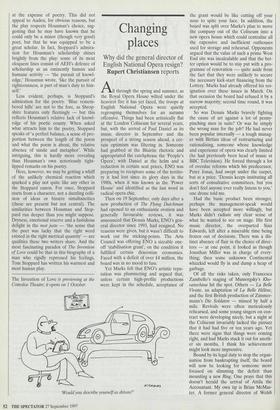ARTS
The poet and the playwright
A.E. Housman appears an unlikely subject for a Stoppard play. Harry Eyres investigates AE. Housman, always an unlikely dra- matic hero, has suddenly become a richly subversive one. Perhaps no figure in liter- ary history could be more out of tune with the current mood of compulsory populist emotionalism than the poet-scholar who on the Sainsbury's scale of dryness for wines would have registered close to absolute zero.
Housman is not the easiest man to defend, or indeed to like. Giv- ing a farewell address to his students at University College London, Housman regretted that, unlike a certain Dartmoor shepherd who knew the faces of all his sheep, he'd never mastered their names. However, he told the students, it had prob- ably been more important for him to remember the Latin declensions. Hous- man's perhaps playful misogyny led him to dub women 'the deplorable sex'. When Wittgenstein, who lived on the same stair- case in Trinity College, Cambridge, asked if he could use Housman's loo, he was refused.
Sixty years ago, Auden delivered one of his devastating character-assessments in the sonnet `A.E. Housman': the picture of the 'heart-injured' Housman keeping 'tears like dirty postcards in a drawer', rigidly dividing himself between the privately tor- mented poet and the publicly austere don, was plausible enough to convince more than one generation. Auden's portrait is not lacking in com- passion; he felt his own situation and Housman's, as sensitive intellectual homo- sexuals in love with beautiful athletes, were parallel. But though Auden could not
Mary Evans Picture Library
A.E. Housman Tom Stoppard blame Housman, the way he embraced his own sexual preference constitutes an implied criticism of Housman's secretive way of repression. And Housman's way seemed to lead inexorably to a decline in poetic inspiration and output: more than half the lyrics of A Shropshire Lad were composed in a few months in 1895. The remaining 40 years of Housman's life, mainly devoted to completing a definitive edition of an unread minor Latin poet, pro- duced not much more than a slim volume's worth of original verse.
One of the obvious problems of writing a play about Housman's life, as Stoppard admits, is its marked, and clearly deliber- ate, absence of incident. Not only that but the crucial events — Housman's failure in Greats, which meant that one of the great- est Latinists in the history of European scholarship went down from Oxford with- out an honours degree, and his unrequited love for Moses Jackson — are shrouded in mystery. In the case of the failure in Greats, the mystery is one that Stoppard feels it would be spurious to resolve.
Throughout the play, the dying, desiccat- ed don AEH and his younger self, the rela- tively open-hearted Housman — played respectively in Richard Eyre's valedictory production for the Royal National Theatre by John Wood and Paul Rhys — are coun- terpoised. Much of the first act happens at Oxford, where Housman falls in love not only with the heterosexual scientist-oars- man Jackson but also with the Latin love- elegy, and discovers his vocation as textual critic. The second act shows him in Lon- don, after his unexpected failure in Greats, working as a clerk at the Patent Office and sharing digs with Jackson, while doing the spare-time classical scholarship which led to his election as Latin Professor at UCL.
Part of the fascina- tion of this rich play comes from Stop- pard's acute, witty rendering of the cul- tural context of late Victorian Oxford, in particular its (homo)sexual under- currents, conflicts and hypocrisies. In the first act the hectic It was Housman's fate to be able to embrace neither Ruskin's asceticism nor Pater and Wilde's over-ripe aestheticism. Or to put it another way, he could neither deny his love for a man nor give it florid expression. He regarded homosexuality as a shameful misfortune. Auden in the hey- day of psychoanalysis or contemporary gay orthodoxy might argue that Housman's anguish could have been eased by coming out. Stoppard feels that coming out 'for Housman was an impossibility — it would have been against his nature'. What Hous- man embraced instead, and expressed in the purged, clenched, despairing eroticism of the Shropshire Lad lyrics, was a 'classical' stoicism made infinitely harder and grim- mer, by Christian morality, than the sto- icism of the ancients.
The same stoicism was reflected in the decision to concentrate on textual criticism at the expense of poetry. This did not appeal to Auden, for obvious reasons, but the play respects Housman's choice, sug- gesting that he may have known that he could only be a minor (though very good) poet, but that he was equipped to be a great scholar. In fact, Stoppard's admira- tion for Housman's scholarship shines brightly from the play: some of its most eloquent lines consist of AEH's defence of scholarship as an eminently human and humane activity — 'the pursuit of knowl- edge,' Housman wrote, 'like the pursuit of righteousness, is part of man's duty to him- self.'
Less evident, perhaps, is Stoppard's admiration for the poetry. 'Blue remem- bered hills' are not to the fore, as Shrop- shire features only fleetingly — but this reflects Housman's relative lack of knowl- edge of his poetic county. When asked what attracts him to the poetry, Stoppard speaks of 'a perfect balance, a sense of pro- portion between the length of the poem and what the poem is about, the relative absence of simile and metaphor'. While intriguing, this is hardly more revealing than Housman's own notoriously tight- lipped remarks on his poetry.
Here, however, we may be getting a whiff of the unlikely chemical reaction which sparked a play not quite like any other in the Stoppard canon. For once, Stoppard starts from a character, not a dazzling colli- sion of ideas or bizarre simultaneities (these are present but not central). The similarities between Housman and Stop- pard run deeper than you might suppose. Dryness, emotional reserve and a fastidious delight in the mot juste — 'the sense that the poet was lucky that the right word existed in the right metrical quantity' — are qualities these two writers share. And the most fascinating paradox of The Invention of Love could be that in this biography of a man who rigidly repressed his feelings, Tom Stoppard has written his warmest and most human play.











































































 Previous page
Previous page